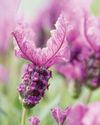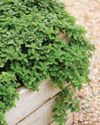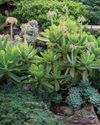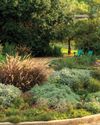
By removing certain parts of a plant – buds, branches or roots – you can promote healthier growth, stimulate new growth, improve the shape and control to some degree the spread of pests and diseases to name just a few. Here are some of the benefits of pruning:
Rejuvenate
One of the most important reasons to prune, is to stimulate new growth, sometimes bushier growth, which also in turn produces more stems and more leaves and ultimately more flowers. Over time, plants will become leggy and lose their vigour. There are various degrees of pruning from a simple pinching with your fingers to more extreme pruning to rejuvenate and enhance.
Finger pruning or pinching
The lightest of pruning is to pinch off the new shoots at a node that forces the plants to make two or three new stems. The reason to do this is to create bushier plants – more leaves in herbs for example. Finger pruning is also done on Hybrid Tea roses to stagger and extend the flowering flush.
Not all roses though need this treatment. It also encourages the roots to absorb nutrients for growth and flowers and encourages new basal shoots which give the plant its shape for the new season. This is also applicable to young seedlings or bedding plants, specifically those which tend to want to reach for the skies rather than filling out and bushing out first. Examples of this are snapdragons – the tall growing varieties, sweet peas, delphiniums and tall flowering zinnias.
Deadheading
Denne historien er fra September 2023-utgaven av The Gardener.
Start din 7-dagers gratis prøveperiode på Magzter GOLD for å få tilgang til tusenvis av utvalgte premiumhistorier og 9000+ magasiner og aviser.
Allerede abonnent ? Logg på
Denne historien er fra September 2023-utgaven av The Gardener.
Start din 7-dagers gratis prøveperiode på Magzter GOLD for å få tilgang til tusenvis av utvalgte premiumhistorier og 9000+ magasiner og aviser.
Allerede abonnent? Logg på

FIRE AND Feathers!
On a dreary winter's day, a screen of fiery and feathery leaves puts up a fight against dullness!

GET THE ladies in!
At this time of year, early-flowering shrubs vie with each other to get the most attention. We say: Trust those with female names for frills and butterflies. They go the extra mile to flower their hearts out.

Vegetable Soups and dumplings
Vegetables make the most delicious soups and classic combinations are always a winner.

Yummy sweet potatoes for your good health
Boiled, baked or braaied, sweet potatoes (Ipomoea batatas) are a delicious and healthy winter comfort food. Just a dollop of butter, a little seasoning and you are good to go.

Pretty and functional
If cooking is your main thing, you would probably be more interested in the culinary value of the three herbs and some of their varieties we are describing.

Dried Seedheads & Pods
Autumn and winter are the best times to see what flowers produce the best seedheads that can be left on the plants to feed the birds and bugs and for harvesting for dried arrangements.

SO MANY FACES and so many choices...
Whoever associated a Cotyledon orbiculata (pig's ear) with the ear of a pig obviously did not know about all the varieties and cultivars this species in the genus Cotyledon has.

COLOURFUL Cold Weather WINNERS!
If it comes to a vote, these dependable shrubs will be the top candidates for prime performance in winter and in other seasons...

What makes a garden sustainable?
It is interesting to note that the United Nations defines sustainable development as: “development that meets the needs of the present without compromising the ability of future generations to meet their own needs”.

Nurturing NATURE-The Story of Kraal Garden's Transformation
Nestled within Prince Albert's rustic embrace lies a gem that is a testament to the transformative power of human vision and nature's bounty.